Some in Malaysia’s flood-prone areas question move to hold election during the monsoon
Opposition politicians have highlighted potential logistical issues, including polling facilities being forced to double up as flood relief centres on election day.
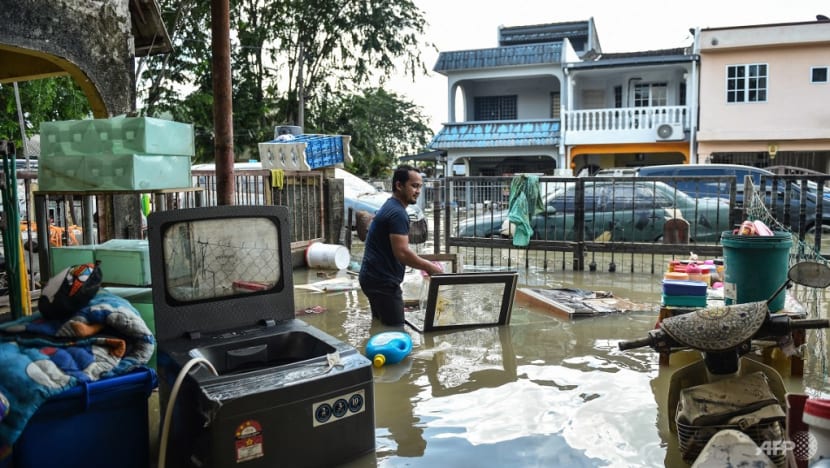
A man salvaging items from his house after it was submerged in flood waters in Shah Alam, Selangor, on Dec 21, 2021. (File photo: Arif Kartono/AFP)
KUANTAN, Malaysia: On the same day Prime Minister Ismail Sabri Yaakob announced the dissolution of parliament, tour driver Mohd Shahrir Jamian was standing on the wooden veranda of his home, washing off mud and slime from his belongings.
The village he lives in - Kampung Mohd Amin in Johor Bahru - was hit by flash floods after a heavy bout of rain caused a nearby drain to overflow two weeks ago.
Since then, Mr Mohd Shahrir, his wife and two sons have been reeling from the loss of their belongings.
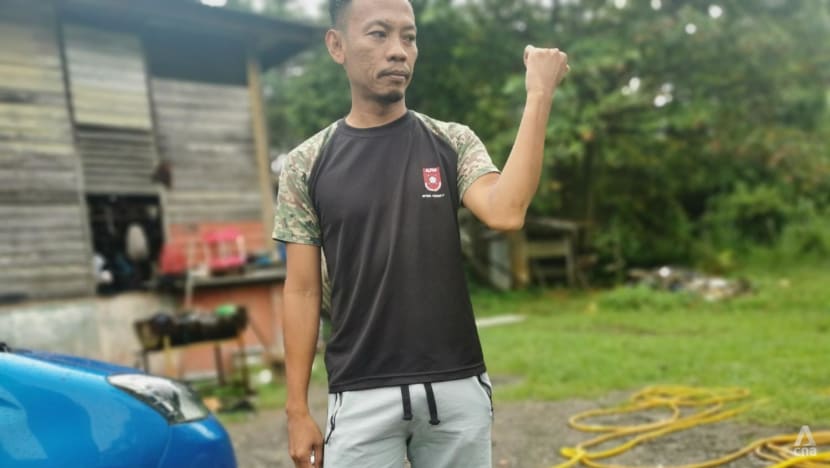
“We lost almost everything - the fridge, washing machine and many of our other belongings. And since the water (level) rose so high that day, for a moment I thought I was going to lose my children,” said the 40-year-old.
“The last thing I want to be thinking about now is elections, politics and campaigning. I’m just worried about my family’s survival,” he added.
The dissolution of parliament on Monday (Oct 10) paves the way for Malaysia’s 15th General Election (GE15) to be held before Dec 9. This means that the campaigning and polling day will likely happen amid heavy rainfall during the north-east monsoon season, which typically lasts between October and March.
The move by Mr Ismail Sabri and his party the United Malays National Organisation (UMNO) to trigger polls when many parts of the country may be affected by floods has drawn criticism.
CNA spoke to some residents in flood-prone areas and the overall sentiments were frustration as well as disbelief that polls would be held during this period.
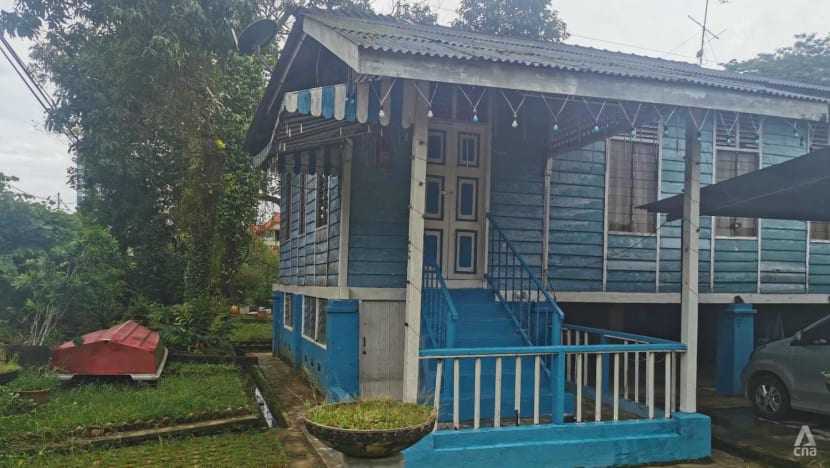
Mr Mohd Shahrir said that his home typically gets affected by floods at least twice during the annual monsoon season. “There is a fair chance” this could happen again during the upcoming national polls, he said.
“It’s just not practical to hold national elections during this period. The rain is so frequent and the water level along the coast is so high,” he said.
“If let's say they hold elections and it floods on the same day, should I then leave my house and belongings to go vote at the polling centre? No, it's not a good idea. Survival comes first.”
Residents on the east coast of Peninsular Malaysia - where the impact of the monsoon is typically felt the hardest - have also expressed frustration.
Housewife Nur Azizan Morshidi who lives in Kampung Mawar near Kota Tinggi, Johor, told CNA that she was shocked to hear about the parliament dissolution.
The memory of her and some of her neighbours being displaced from their homes due to “waist-high floods” in January was still fresh in her mind.
“Couldn’t they have waited until March or April, when the weather is calmer? These days it has been raining almost every day, and we are worried all the time about what might happen,” said Mdm Nur Azizan.
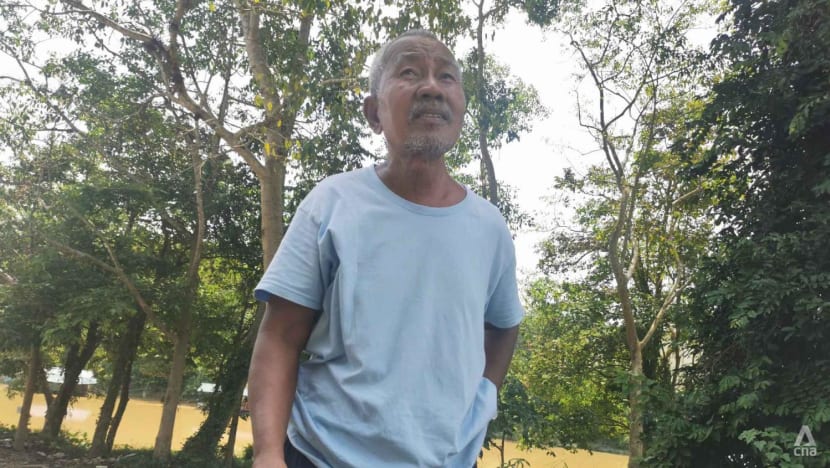
Mr Arrifin Arshad who lives in Mentakeb, Pahang recounted how he was among the 70,000 residents who were displaced from their homes when severe year-end floods hit several states in 2021.
Heavy rain, described by authorities as a once in a hundred years weather event, caused the Pahang River to overflow. Floodwaters engulfed his home and rose to the roof, and he and his family members had to be saved by firefighters on rescue boats, pulling them out from a window.
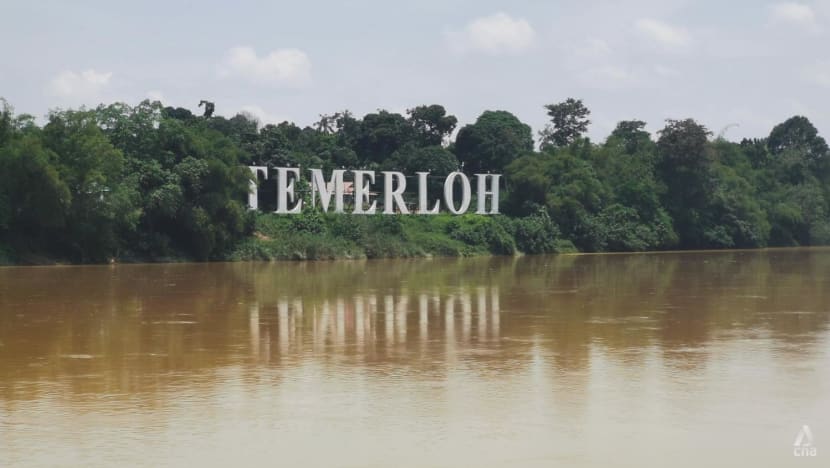
It’s crazy that just months after that incident, they are thinking of holding elections (during this monsoon season). It's a complete disregard for the lives and livelihoods of thousands of voters,” said the 62-year-old.
“If it floods again (on polling day), I would not risk my health and my life to go cast a ballot,” he added.
THE WORST FLOODING IS YET TO COME: OPPOSITION
UMNO’s and Barisan Nasional (BN) coalition’s calls for an early election have been criticised by the opposition and Mr Ismail Sabri’s own Cabinet members. Malaysia’s Meteorological Department has also warned of heavy rain and floods during the upcoming monsoon season.
Opposition politicians interviewed by CNA noted that sporadic flash floods are already occurring in some areas, a possible sign that the worst is yet to come.
Parti Keadilan Rakyat (PKR) strategy director Akmal Nasrullah Mohd Nasir said: “We can all see that the worst part of the monsoon is coming. We have seen the weather transitioning over the last few weeks, and we have already seen the impact to the residents who have experienced flash floods.”
“It’s pretty straightforward. We cannot postpone the monsoon, but we can postpone the elections,” said the incumbent Member of Parliament for Johor Bahru.
PKR is part of the opposition Pakatan Harapan coalition.
He added that of the nine states due to hold state elections in tandem with the national polls, six have declined to dissolve their state assemblies. This leaves only three states led by UMNO and BN - Pahang, Perak and Perlis.
The presidential council of PH said in a statement last Wednesday that the three states controlled by the coalition - Selangor, Negeri Sembilan and Penang - will only dissolve their state assemblies next year due to concerns over floods.
State assemblies led by Parti Islam Se-Malaysia (PAS) - Kelantan, Terengganu and Kedah - will also not be dissolved if a general election is held soon, said party deputy president Tuan Ibrahim Tuan Man last Wednesday.
Ms Amira Aisya Abdul Aziz, deputy president for youth-centric Malaysian United Democratic Alliance (MUDA), told CNA that the decision to call for elections during this uncertain period was the act of a “cruel government” with no regard for the sufferings of the people.
She said that if floods were to occur in some areas on polling day, it would be a logistical problem given that polling stations like schools and community centres are likely to double up as relief centres for flood victims.
“At the end of the day, those who are overworked will be civil servants like the police officers, who may be stretched by balancing flood rescue operations and ensuring that the electoral process runs smoothly,” added the state assemblywoman for the Puteri Wangsa constituency in Johor.
UMNO’S EARLY POLLS GAMBIT MAY BACKFIRE: ANALYST
UMNO president Ahmad Zahid Hamidi has consistently maintained that the opposition have been using the flood narrative to resist an early GE15, describing it as a “myth”.
He noted that in 1999, then prime minister Mahathir Mohamad called for snap polls in November and “it did not become a big issue” at that time.
In a Facebook post after parliament was dissolved, he wrote: “UMNO and its leadership once again magnanimously returned the mandate to the people to decide on a new government.
“UMNO asked for parliament to be dissolved when the coalition government is at the height of its powers for the benefit and future of the people and the country.
“God willing, this is the right step to give the people the mandate to restore stability and prosperity to Malaysia.”
Mr Ismail Sabri also said that he opted to dissolve parliament in order to prevent disharmony in the Cabinet, after Perikatan Nasional (PN) ministers wrote to the king to voice their objections over holding polls during the monsoon season this year.
Political analyst Wong Chin Huat, who is the deputy head overseeing strategy issues for the United Nations Sustainable Development Solutions Network's Asia headquarters (SDSN-Asia) at Sunway University, acknowledged that there are strategic reasons why UMNO and BN have opted to call for early polls.
However, he maintained that it is a gamble that could backfire, especially if voters are angered by scenes of floods during the course of campaigning.
“UMNO may justify the early poll using various reasons such as how the opposition is in disarray and their voters are demoralised now, the coalition government (led by PM Ismail Sabri) is unstable and that the economy will get worse next year,” said Prof Wong.
“But none of these can be sure to offset the risk of having voters turning against BN for insisting on GE15 amid floods.
Prof Wong also rejected Ahmad Zahid’s comparison with the general elections in 1999 given how climate change has exacerbated the likelihood of extreme weather patterns in Malaysia.
“UMNO and BN’s goal is to win 70 to 80 seats in the peninsula to dominate the next government. That's 30 to 40 seats more than the 40 seats it currently holds. While its hardcore supporters in its strongholds may vote for UMNO despite experiencing floods, how likely is that in marginal constituencies?” said Prof Wong.
PKR’s Mr Akmal Nasrullah also warned of a possible backlash from voters against UMNO and BN for insisting on early polls. He noted that netizens have turned to social media to express disappointment at the timing of the polls.
The hashtag #UndiBanjir, which rallies support against BN and UMNO’s decision to call for polls during the monsoon season, has been trending on Twitter and TikTok since Mr Ismail Sabri announced the dissolution of parliament on Monday.
“I can foresee that voters will use this opportunity as a referendum to punish the UMNO leadership for dragging down the whole nation in the name of their own interests,” he added.




















